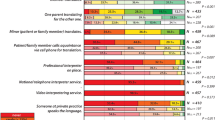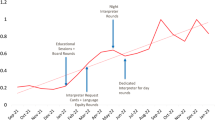Abstract
The treatment of migrants with limited language proficiency poses major challenges to health care professionals. The use of professional interpreters in medical settings is still limited, which is, among other reasons, due to cost concerns. We performed a literature search in PubMed and included 11 articles examining cost and cost-effectiveness of using professional interpreters. Despite mixed findings, most studies indicated improvement of medical care and the investigated treatment outcome at limited additional cost or cost-savings. The interpretation of findings is limited by the sparsity of available studies, mixed settings as well as different outcome parameters. Therefore, more research on the benefits of using professional interpreters is required. Nonetheless, the available studies indicate a benefit for both patients and health care systems at very limited cost as compared to other expenditures in health care, supporting the call for a more widespread use of professional interpreters with scientific evaluation.
Similar content being viewed by others
References
Schouler-Ocak M. Mental health care for immigrants in Germany. Nervenarzt. 2015;86:1320–5.
Fiscella K, Franks P, Doescher MP, Saver BG. Disparities in health care by race, ethnicity, and language among the insured: findings from a national sample. Med Care. 2002;40:52–9.
Baarnhielm S, Aberg Wistedt A, Rosso MS. Revising psychiatric diagnostic categorisation of immigrant patients after using the Cultural Formulation in DSM-IV. Transcult Psychiatry. 2015;52:287–310.
Bauer AM, Alegria M. Impact of patient language proficiency and interpreter service use on the quality of psychiatric care: a systematic review. Psychiatr Serv. 2010;61:765–73.
Karliner LS, Jacobs EA, Chen AH, Mutha S. Do professional interpreters improve clinical care for patients with limited English proficiency? A systematic review of the literature. Health Serv Res. 2007;42:727–54.
Flores G, Abreu M, Barone CP, Bachur R, Lin H. Errors of medical interpretation and their potential clinical consequences: a comparison of professional versus ad hoc versus no interpreters. Ann Emerg Med. 2012;60:545–53.
Tate RC, Kelley MC. Triage in the Tower of Babel: interpreter services for children in the prehospital setting. Pediatr Emerg Care. 2013;29:1280–2.
Quan K, Lynch J. The high costs of language barriers in medical malpractice. Berkeley, CA: National Health Law Program; 2010.
US Department of Health and Human Services Nondiscrimination in Health Programs or Activities. https://www.gpo.gov/fdsys/pkg/FR-2016-05-18/pdf/2016-11458.pdf. Accessed 10 Oct 2018.
Lundin C, Hadziabdic E, Hjelm K. Language interpretation conditions and boundaries in multilingual and multicultural emergency healthcare. BMC Int Health Hum Rights. 2018;18:23.
Gadon M, Balch GI, Jacobs EA. Caring for patients with limited English proficiency: the perspectives of small group practitioners. J Gen Intern Med. 2007;22(Suppl 2):341–6.
Hsieh E. Not just “getting by”: factors influencing providers’ choice of interpreters. J Gen Intern Med. 2015;30:75–82.
Diamond LC, Schenker Y, Curry L, Bradley EH, Fernandez A. Getting by: underuse of interpreters by resident physicians. J Gen Intern Med. 2009;24:256–62.
Ku L, Flores G. Pay now or pay later: providing interpreter services in health care. Health Aff (Millwood). 2005;24:435–44.
Jacobs EA, Leos GS, Rathouz PJ, Fu P Jr. Shared networks of interpreter services, at relatively low cost, can help providers serve patients with limited english skills. Health Aff (Millwood). 2011;30:1930–8.
Jacobs EA, Shepard DS, Suaya JA, Stone EL. Overcoming language barriers in health care: costs and benefits of interpreter services. Am J Public Health. 2004;94:866–9.
Schreiter S, Winkler J, Bretz J, Schouler-Ocak M. What do interpreters cost?—a retrospective analysis of the costs for interpreters in treatment of refugees in a psychiatric outpatient clinic in Berlin. Psychother Psychosom Med Psychol. 2016;66:356–60.
Drennan G. Counting the cost of language services in psychiatry. S Afr Med J. 1996;86:343–5.
Bischoff A, Denhaerynck K. What do language barriers cost? An exploratory study among asylum seekers in Switzerland. BMC Health Serv Res. 2010;10:248.
Jacobs EA, Lauderdale DS, Meltzer D, Shorey JM, Levinson W, Thisted RA. Impact of interpreter services on delivery of health care to limited-English-proficient patients. J Gen Intern Med. 2001;16:468–74.
Jacobs EA, Sadowski LS, Rathouz PJ. The impact of an enhanced interpreter service intervention on hospital costs and patient satisfaction. J Gen Intern Med. 2007;22(Suppl 2):306–11.
Hampers LC, Cha S, Gutglass DJ, Binns HJ, Krug SE. Language barriers and resource utilization in a pediatric emergency department. Pediatrics. 1999;103:1253–6.
Hampers LC, Mcnulty JE. Professional interpreters and bilingual physicians in a pediatric emergency department: effect on resource utilization. Arch Pediatr Adolesc Med. 2002;156:1108–13.
Lindholm M, Hargraves JL, Ferguson WJ, Reed G. Professional language interpretation and inpatient length of stay and readmission rates. J Gen Intern Med. 2012;27:1294–9.
Bernstein J, Bernstein E, Dave A, Hardt E, James T, Linden J, Mitchell P, Oishi T, Safi C. Trained medical interpreters in the emergency department: effects on services, subsequent charges, and follow-up. J Immigr Health. 2002;4:171–6.
Jacobs E, Chen AH, Karliner LS, Agger-Gupta N, Mutha S. The need for more research on language barriers in health care: a proposed research agenda. Milbank Q. 2006;84:111–33.
Vanderwielen LM, Enurah AS, Rho HY, Nagarkatti-Gude DR, Michelsen-King P, Crossman SH, Vanderbilt AA. Medical interpreters: improvements to address access, equity, and quality of care for limited-English-proficient patients. Acad Med. 2014;89:1324–7.
Phillips CB, Travaglia J. Low levels of uptake of free interpreters by Australian doctors in private practice: secondary analysis of national data. Aust Health Rev. 2011;35:475–9.
Schouler-Ocak M, Graef-Calliess IT, Tarricone I, Qureshi A, Kastrup MC, Bhugra D. EPA guidance on cultural competence training. Eur Psychiatry. 2015;30:431–40.
Hoop JG, Dipasquale T, Hernandez JM, Roberts LW. Ethics and culture in mental health care. Ethics Behav. 2008;18:353–72.
Acknowledgements
EJB and SS are participants in the Clinician Scientist Program of Charité and the Berlin Institute of Health.
Author information
Authors and Affiliations
Corresponding author
Ethics declarations
Conflict of interest
EJB has received speaker fees from Servier and Medice. MS-O has received speaker fees from Servier and Forum für medizinische Fortbildung as well as for expert opinions provided for courts. SS declares no conflict of interest.
Additional information
Publisher's Note
Springer Nature remains neutral with regard to jurisdictional claims in published maps and institutional affiliations.
Rights and permissions
About this article
Cite this article
Brandl, E.J., Schreiter, S. & Schouler-Ocak, M. Are Trained Medical Interpreters Worth the Cost? A Review of the Current Literature on Cost and Cost-Effectiveness. J Immigrant Minority Health 22, 175–181 (2020). https://doi.org/10.1007/s10903-019-00915-4
Published:
Issue Date:
DOI: https://doi.org/10.1007/s10903-019-00915-4




